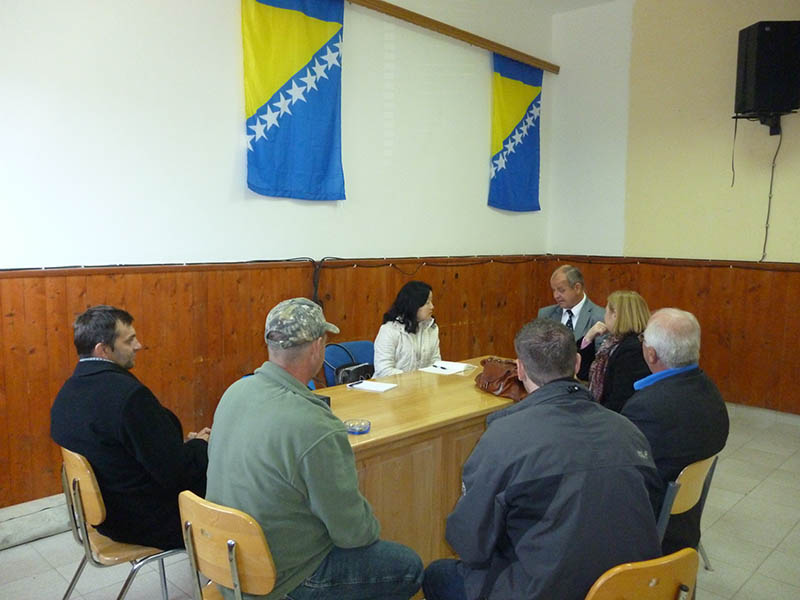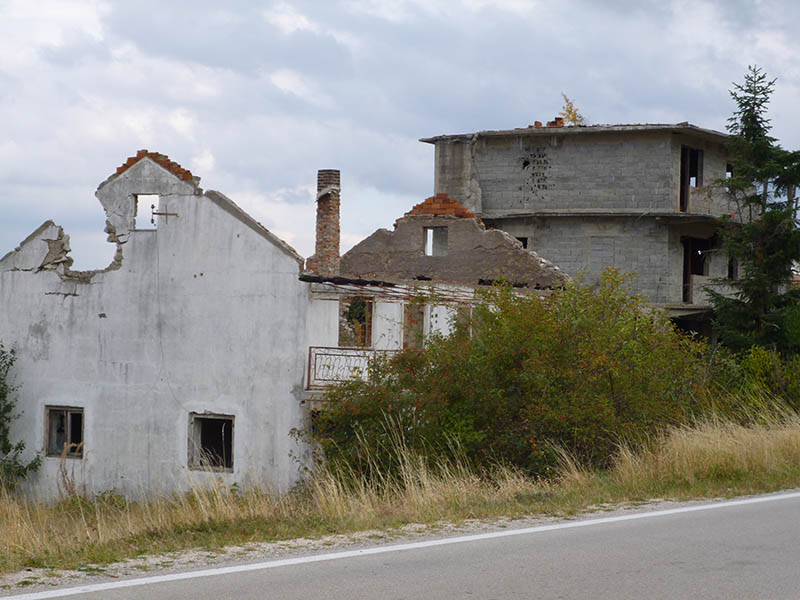Hearings on Land Issue in Bosnia and Herzegovina Reveal True State of the Problem
2011.12.07
JICA-RI research fellow Mari Katayanagi visited Bosnia and Herzegovina (BiH) from October 9 to November 6 as part of the research under "Land and Property Problems in Post-Conflict Sate-building and Economic Development" project. She is in charge of the BiH case study for this research project, which targets eight countries throughout Africa, Asia, Europe, and South America.
While in BiH, she visited 11 municipalities starting from Sarajevo, the capital, and interviewed a total of 50 people, including mayors, municipality officials, faculty professors, farmers, and returnees.

Mari Katayanagi, third from left
The oral survey was conducted with three main objectives.
The first was to gain a better understanding of the issues of property restoration for refugees and displaced persons in BiH, a country which has been called one of the few successful examples of property being restored in a post-conflict situation.
The second objective was to look into the problems of land use. One example is farmland fragmentation, an ill effect of the inheritance system that is blamed for hindering agricultural development. Another is the status of requisitioned land that was confiscated during the Socialist era and which has since been turned into public property.
The third point was to study the progress of the resolution of state property issues, which happens to be one of the conditions for closure of the Office of the High Representative (OHR) -- the institution responsible for overseeing implementation of the civilian aspects of the Dayton Agreement.
According to Katayanagi, many recent academic studies on the subject of property restoration address the work of the Commission for Real Property Claims of Displaced Persons and Refugees (CPRC), an effort led by the international community. But her survey revealed, along with local administrative mechanism, the existence of successful cases of restoration through direct dialogs between displaced persons and property occupants.

More and more land issues are being tackled in BiH
Katayanagi also pointed out that there was a method of property restoration for owners who had no intention of returning. In this method, owners would send out a written authorization to a prospective buyer, have the property restoration claim executed on their behalf, and sell the property to the buyer once it had been restored, she said.
The hearings provided an opportunity for Katayanagi to see the true picture of the issues, which is often difficult to grasp only with literature studies. For land use, she found out that farmers – even small-scale ones – usually cultivated two or three separate plots of land. In an interview, two professors from the University of Sarajevo's Faculty of Agriculture confirmed that this fragmentation of farmland has become an obstacle to development.
The survey also showed that municipalities are having trouble handling land requisitioned before or during the Socialist era due to the fact that restitution law is not adopted yetf. While some municipalities lease out public land for the time being even with ambiguous future ownership, others refrain from doing so, not wanting to risk the responsibility if land disputes should arise later. This is no doubt another major obstacle to development, Katayanagi said.
Meanwhile, there has been no visible progress in state-level efforts for state property. In fact these efforts have been retreating. The OHR compiled an inventory of state property in 2009, but the discussions between the two entities (which make up BiH) on how to distribute this property have been dragging on without any progress being made. Since new Council of Ministers is yet to be formed following the October 2010 election, most key matters have come to a standstill.
Under these circumstances, the entity of the Republic of Srpska (RS), one of the two entities, has adopted a law on the status of state property located in the territory of RS and under the disposal ban. The law is under constitutional review before the Constitutional Court of Bosnia and Herzegovina, with a ruling set for January 2012.It is important to keep a close watch on future proceedings, as it could affect BiH's peace-building process.
Katayanagi recently presented her research findings on BiH's land and property problems at the 22nd Conference of the Japan Society for International Development (JASID) and she will continue with her research and conduct another field survey next fiscal year.

事業事前評価表(地球規模課題対応国際科学技術協力(SATREPS)).国際協力機構 地球環境部 . 防災第一チーム. 1.案件名.国 名: フィリピン共和国.

事業事前評価表(地球規模課題対応国際科学技術協力(SATREPS)).国際協力機構 地球環境部 . 防災第一チーム. 1.案件名.国 名: フィリピン共和国.

事業事前評価表(地球規模課題対応国際科学技術協力(SATREPS)).国際協力機構 地球環境部 . 防災第一チーム. 1.案件名.国 名: フィリピン共和国.

事業事前評価表(地球規模課題対応国際科学技術協力(SATREPS)).国際協力機構 地球環境部 . 防災第一チーム. 1.案件名.国 名: フィリピン共和国.

事業事前評価表(地球規模課題対応国際科学技術協力(SATREPS)).国際協力機構 地球環境部 . 防災第一チーム. 1.案件名.国 名: フィリピン共和国.
scroll